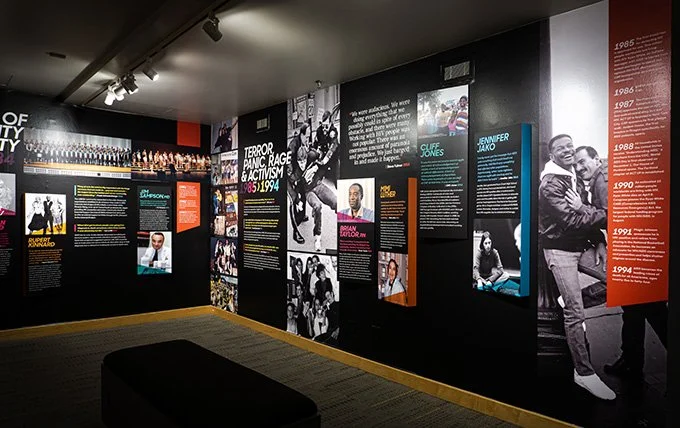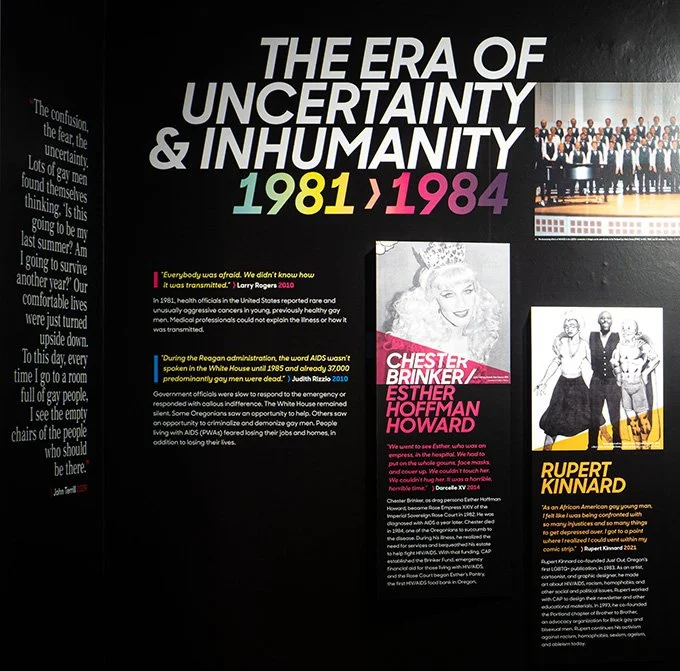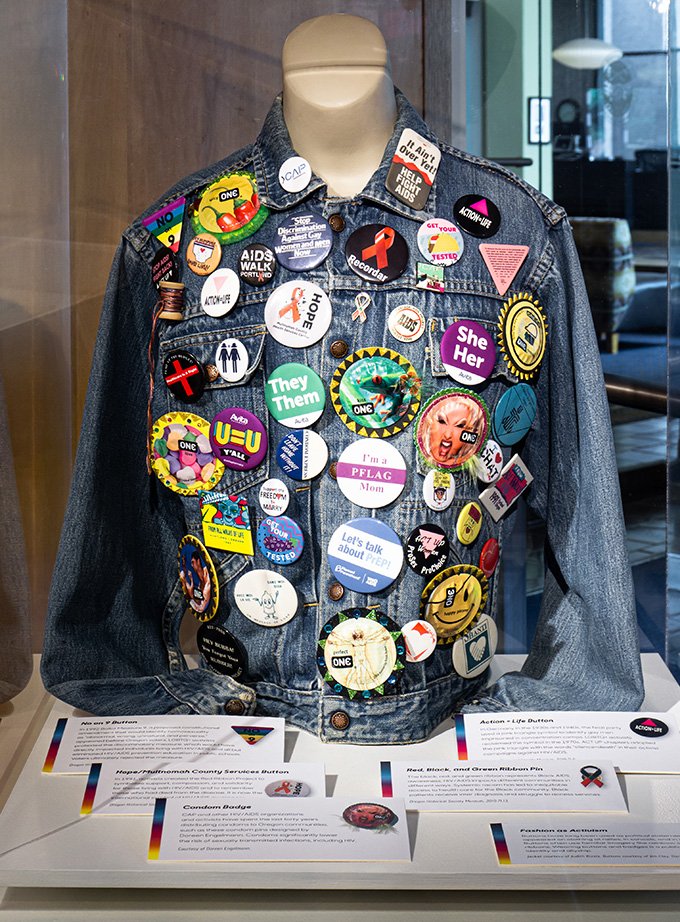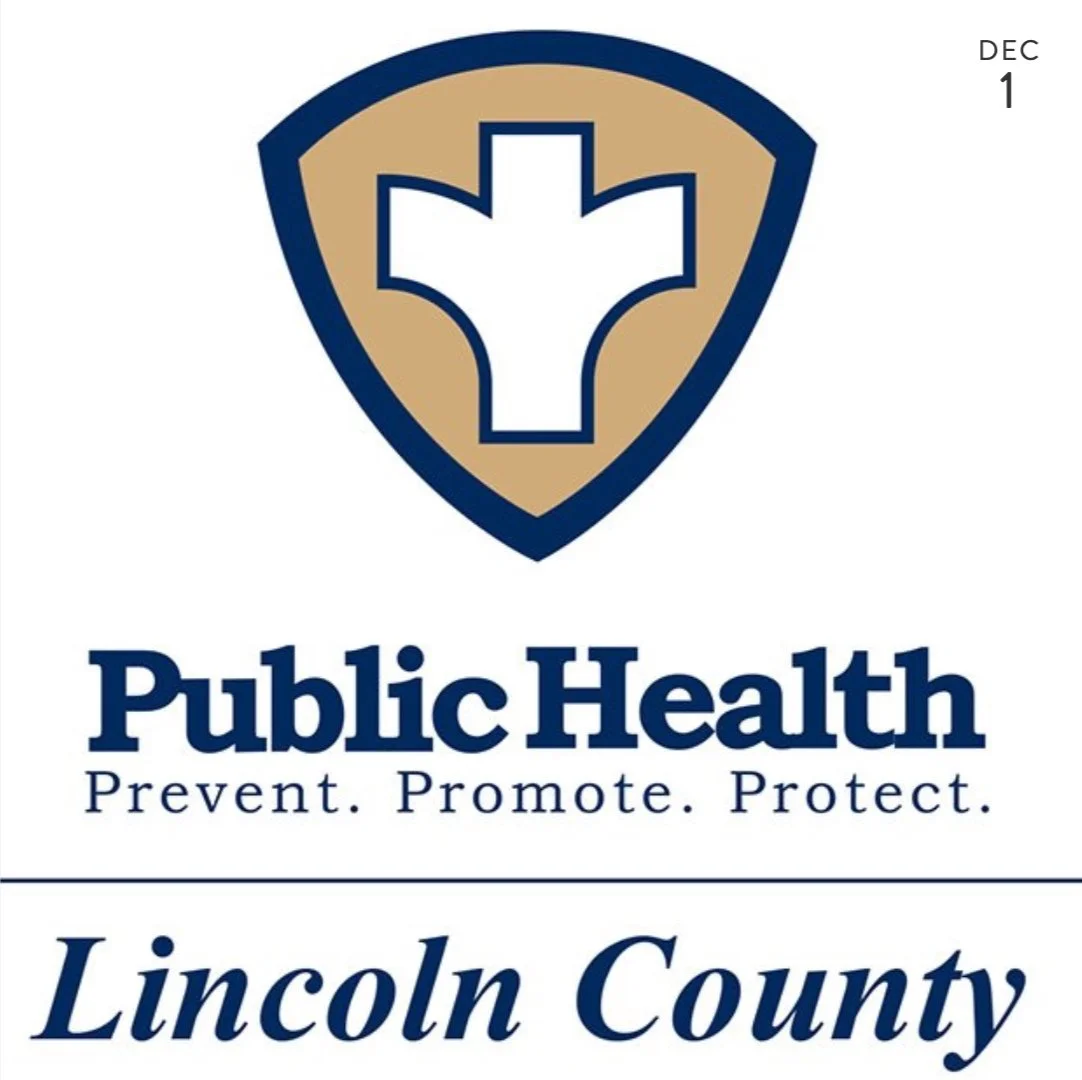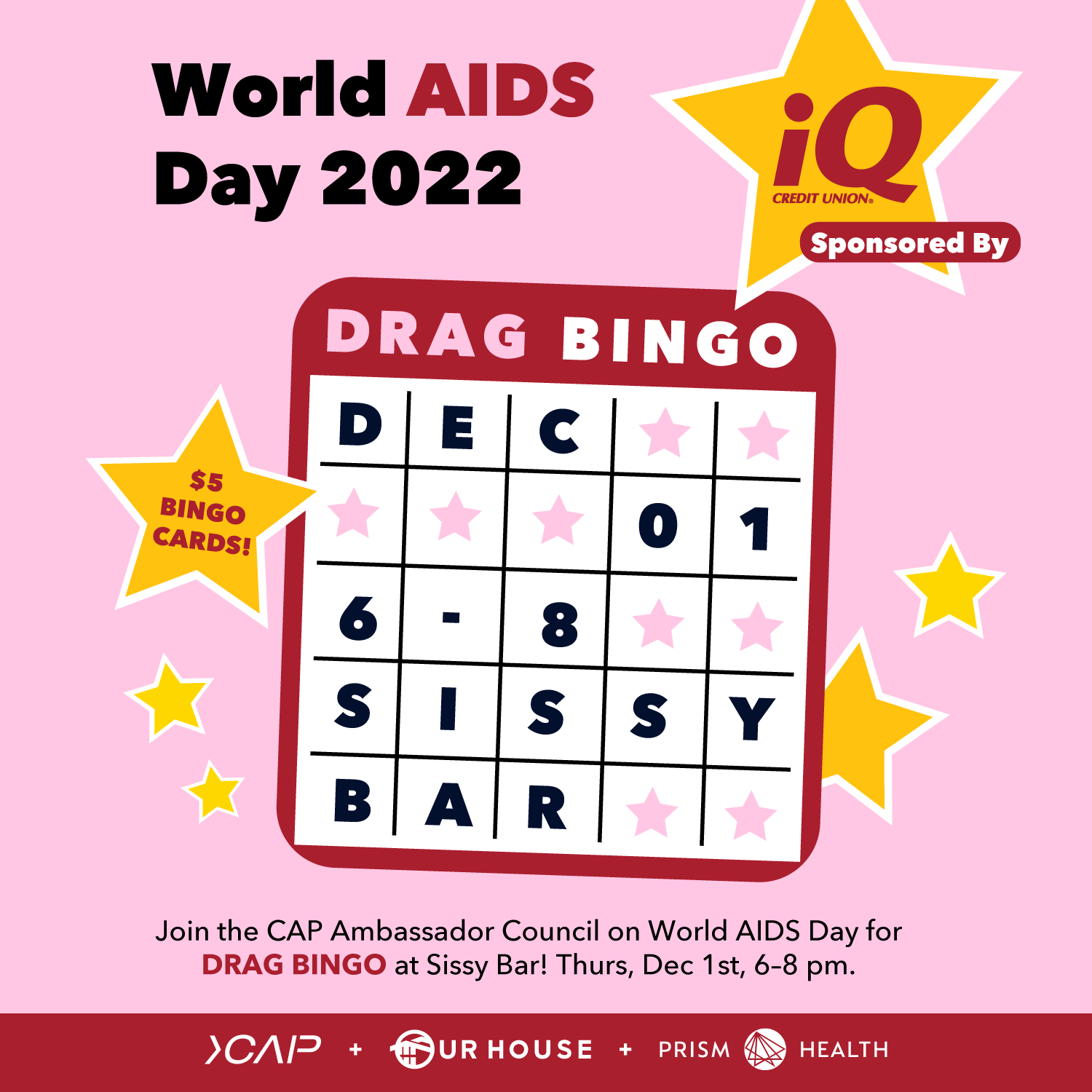In Remembrance of 40 Years of HIV & AIDS | World AIDS Day 2022
Founded in 1988, World AIDS Day was the first ever international day for global health. Every year, folks across the globe come together to raise awareness of HIV & AIDS in our communities, support those living with and impacted by HIV, advocate for resources to tackle HIV transmission, combat stigma associated with HIV & AIDS, and, above all, remember those lost to us due to HIV & AIDS. World AIDS Day remains as relevant today as it’s always been, reminding people and governments that HIV has not gone away. There is still a critical need for increased funding for the AIDS response, to increase awareness of the impact of HIV on people’s lives, to end stigma, and discrimination and to improve the quality of life of people living with HIV. This past summer, CAP & Our House had the pleasure of working with the Oregon Historical Society to help document & chronicle the past 40 years of our HIV & AIDS work and highlight the voices of community members affected by HIV & AIDS in Oregon. Together, we created the exhibit: “It’s Not Over: Forty Years of HIV & AIDS in Oregon” which was on display at the Oregon Historical Society from June 10 to August 14, 2022. To honor World AIDS Day, we want to share a bit from that exhibit, testimony before the city council from our Aging Well Team, as well as some ways you can center remembrance and visibility in observing this important day for our communities.
Written by Kayla Blackman. Photographs by Evan Kierstead
“It’s Not Over: Forty Years of HIV/AIDS in Oregon” is an exhibition on display at the Oregon Historical Society from June 10 to August 14, 2022. It documents the work of Cascade AIDS Project and Our House of Portland and highlights the voices of community members affected by HIV/AIDS in Oregon. Photograph by Evan Kierstead.
In 1981, HIV & AIDS appeared in Oregon and across the nation. This terrifying new disease caused young, otherwise healthy individuals to experience debilitating respiratory conditions and rare skin cancers that killed quickly — no treatments at that time seemed to work. HIV & AIDS affects individuals of all ethnicities, gender identities, ages, and sexual orientations, however, the disease provoked intense stigma and discrimination when it was initially linked to gay men. Nationwide, HIV/AIDS killed more than 700,000 Americans between 1981 and 2021; 4,613 of them lived in Oregon.
Although continuous advocacy from community activists as well as ongoing scientific study have led to tremendous advances in the fight against the disease, the epidemic is not over. A new exhibition at the Oregon Historical Society, It’s Not Over: Forty Years of HIV/AIDS in Oregon, highlighted the work of two Oregon-based organizations that led community-based services for those with HIV & AIDS. On display from June 10 to August 14, 2022, It’s Not Over focused on the work of Cascade AIDS Project (CAP) and Our House of Portland (Our House) to frame forty years of HIV & AIDS in Oregon. The exhibition is anchored with the voices of activists, health care professionals, and members of the LGBTQIA+ community. It acknowledges the intense grief of a deadly epidemic while also celebrating the resiliency of those who survived and those who banded together to support their community in times of crisis.
“It’s Not Over” is arranged chronologically into four sections. Rather than progressing by decade, the sections are split based on key dates in the HIV & AIDS crisis. Section two, for example, ends in 1995 with the introduction of the “AIDS Cocktail,” one of the first effective medical treatments available to patients. Photograph by Evan Kierstead.
Grassroots organizers and LGBTQIA+ community members created CAP in 1983 to provide crucial community services in the face of the HIV & AIDS epidemic. Over the next several decades, CAP’s services expanded to include educational outreach, legal advocacy, and primary health care for residents in Oregon and southwest Washington. In 2019, CAP donated a collection of objects and its historical records to the Oregon Historical Society and began the process of designing this exhibition to highlight the materials.
CAP and Our House (originally two separate organizations that merged on January 1, 2022) hired Historical Research Associates, Inc. (HRA) and Bryan Potter Design to develop the exhibition and secured additional funding and support from Wells Fargo, the Oregon Cultural Trust, and the Multnomah County Cultural Coalition. CAP and Our House created a committee to work alongside the curators and designers to ensure that voices from affected communities took center stage in the exhibition. HRA crafted the exhibition using the CAP collections, staff members, volunteers, and clients as a lens to explore the HIV & AIDS crisis in Oregon. HRA relied on the organization’s institutional knowledge, including a significant oral history project that documents the stories of those who have been a part of CAP’s community.
Throughout the exhibition, visitors can read firsthand accounts of what it was like to live through the HIV/AIDS crisis in Oregon. Quotes from oral histories and publications during that time document the courage, resiliency, and grief of the community. Photograph by Evan Kierstead.
Quotes from the oral histories and from publications are prominently featured throughout the exhibition, which is divided into four chronological sections that include photographs contributed by CAP and by other individuals and organizations. Many of the materials related to HIV & AIDS are still held in private collections; some records do not exist at all because the social stigma against HIV & AIDS was so strong that many individuals hid their diagnosis and never got an opportunity to share their stories. The exhibition is a testimony to the courage of individuals and organizations who risked personal safety and defied those stigmas to provide care for others.
It’s Not Over includes many important stories, but there are many more stories waiting to be told. Exhibition space is limited; the potential for other researchers, historians, artists, and activists to explore and highlight LGBTQ history is limitless. The curators hope the exhibition sparks interest and invites further exploration of this significant history through the objects and archival records that are preserved in OHS’s museum and research library. For example, the exhibition features a profile on Rupert Kinnard, an artist and activist who contributed illustrations and co-founded Just Out, a Portland-area LGBTQ newspaper. Just Out was printed from 1983 to 2004, making it impossible to explore all the stories, information, and images contained in the long-running periodical within the exhibition. We hope, however, that visitors are inspired to learn more by visiting OHS’s research library, which has an almost complete run of the publication as part of its Gay and Lesbian Periodicals Collection, 1970–2008 (Mss 2988-7).
A “No on 9” rainbow pin (located on the upper left in this photograph) is one of many items on display from OHS’s museum and research library. Photograph by Evan Kierstead.
The exhibition also features a “No on 9” rainbow pin and briefly explains the efforts to defeat Measure 9, a ballot initiative that would have legalized discrimination based on sexual orientation. OHS’s research library has a collection of documents related to the political battle, including the Campaign for a Hate Free Oregon records, 1989–1993 (Mss 2988-3). You can also read about the measure in Will Schultz’s “The Rise and Fall of ‘No Special Rights’,” published in the Spring 2021 issue of the Oregon Historical Quarterly.
The Portland Gay Men’s Chorus contributed two photos to the exhibition; the research library has recordings and programs from their performances in its Gay and Lesbian Organizations Collection, 1972–1996 (Mss 2988-4). Another collection that includes materials documenting the Portland Gay Men’s Chorus is the Lesbian and Gay Choruses Collection, 1986–1998 (Mss 2988-11) — and the effort to preserve that history is ongoing. The collections at the Oregon Historical Society continue to grow. In March 2022, longtime activist and educator Gay Monteverde donated her personal collection of Cascade AIDS Project and AIDS Education materials (Coll 888). In an effort to improve access to these materials, OHS library staff members have created a research guide dedicated to exploring their LGBTQIA+ community collections, which also includes the CAP collection.
While there is an immeasurable void left by those who died during the HIV & AIDS epidemic, there is an equal obligation to remember their names, lives, and legacies in Oregon. Many activists and community members survived — HIV is no longer a death sentence. The social climate has in some ways changed for the LGBTQ community in Oregon; in other ways, there is much to be learned in how the community and its allies have fought against discrimination and hate. That fight is not over either.
World AIDS Day Events
Looking for a way to observe World AIDS Day? Check out some of the events below or visit www.worldaidsdaynw.org for a full calendar of events.
EMO HIV Day Center Pancake Breakfast
Nov 30 | 8:00 AM
Clackamas County - AIDS Memorial Quilt Display
Dec 1 - Dec 21
Lincoln County World AIDS Day Walk
Dec 1 | 12:00 PM - 1:00 PM
World AIDS Day Drag Bingo @ Sissy Bar
Dec 1 | 6:00 PM - 8:00 PM
About Cascade AIDS Project
CAP is a non-profit organization that was founded in 1985 as a grassroots response to the AIDS crisis. As the oldest and largest community-based HIV services provider in Oregon and southwest Washington, we seek to support and empower all people with or affected by HIV, reduce stigma, and provide the LGBTQ+ community with compassionate healthcare. We do so by helping to ensure the health and well-being of our program participants each year through health, housing, and other social services. When the need for affordable, accessible, and culturally affirming primary care services was identified as a community need, we responded by opening Prism Health in 2017. More information can be found at www.capnw.org.


